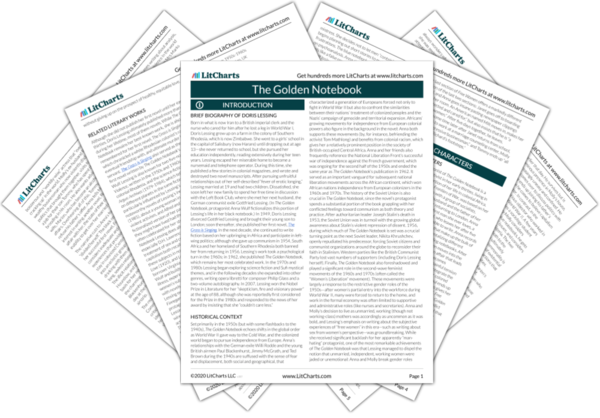The majority of The Golden Notebook consists of the four colored notebooks in which Anna Wulf records her life, which symbolize her disjointed and compartmentalized identity. At least two of these colors have obvious significance: the black notebook is about Anna’s time organizing with socialist, antiracist activists in Africa as well as the publication of her first novel, which was about the barbarity of the color line, and the red notebook records her work in the Communist Party. In the yellow notebook, Anna begins a new novel, The Shadow of the Third, and works through her real-life relationships by imagining fictional “third” versions of herself and the people she knows; in the blue notebook, Anna records her everyday life and her experience in psychoanalysis. Through her confrontations with Tommy in Free Women, Anna learns that she separates her life into these notebooks in an attempt to compartmentalize her identity; she recognizes its multifaceted character but tries to artificially partition the different components of herself into the notebooks, which are themselves fragmented as they are narratively and temporally nonlinear. She fears that writing in only one notebook would be “such a mess,” opening her to chaos. She also wants her notebooks to stay private—she feels “terribly exposed” when Tommy goes through them and worries about spreading her negative feelings in the world. However, Tommy thinks that Anna must choose between dividing her inner turmoil in the notebooks, so that she can spare herself from seeing the totality of her pain, and revealing her thoughts to the world, which he sees as an act of social responsibility: telling the ugly truth others are afraid to hear.
When Anna finally combines her thinking into the golden notebook, she symbolically makes herself whole, overcoming the sense of alienation and creative paralysis that has plagued her as she failed to find love, independence, or another novel within herself. Indeed, just before the golden notebook, Anna’s four notebooks begin to mix, as she often realizes she is slipping into the wrong kind of content. As she begins writing in the singular golden notebook, Anna loses not only the rigid distinctions between the different parts of herself, which mix in the dreams she describes in the golden notebook, but also the distinction between herself and Saul, who seems to invade her consciousness and dreams. Furthermore, when she eventually writes Free Women, the novel’s frame story, Anna not only dissolves the artificial divisions she has created in her identity but also makes the totality of her experience public in the form of fiction, breaking her cycle of creative failure and fulfilling the hopes Tommy had in mind when he promised he would give her “another chance” to honestly address and create from her suffering.
Anna’s Notebooks Quotes in The Golden Notebook
Literature is analysis after the event.
“It's because I keep trying to write the truth and realising it's not true.”
She was thinking: If someone cracks up, what does that mean? At what point does a person about to fall to pieces say: I’m cracking up? And if I were to crack up, what form would it take? […] Anna, Anna, I am Anna, she kept repeating; and anyway, I can’t be ill or give way, because of Janet; I could vanish from the world tomorrow, and it wouldn’t matter to anyone except to Janet. What then am I, Anna? — something that is necessary to Janet. But that’s terrible, she thought, her fear becoming worse. That’s bad for Janet. So try again: Who am I, Anna? Now she did not think of Janet, but shut her out. Instead she saw her room, long, white, subdued, with the coloured notebooks on the trestle table. She saw herself, Anna, seated on the music-stool, writing, writing; making an entry in one book, then ruling it off, or crossing it out; she saw the pages patterned with different kinds of writing; divided, bracketed, broken — she felt a swaying nausea; and then saw Tommy, not herself, standing with his lips pursed in concentration, turning the pages of her orderly notebooks.
It occurs to me that what is happening is a breakdown of me, Anna, and this is how I am becoming aware of it. For words are form, and if I am at a pitch where shape, form, expression are nothing, then I am nothing, for it has become clear to me, reading the notebooks, that I remain Anna because of a certain kind of intelligence. This intelligence is dissolving and I am very frightened.
Then I remembered that when I read my notebooks I didn’t recognize myself. Something strange happens when one writes about oneself. That is, one’s self direct, not one’s self projected. The result is cold, pitiless, judging. […] If Saul said, about his diaries, or, summing his younger self up from his later self: I was a swine, the way I treated women. Or: I’m right to treat women the way I do. Or: I’m simply writing a record of what happened, I’m not making moral judgements about myself — well, whatever he said, it would be irrelevant. Because what is left out of his diaries is vitality, life, charm. “Willi allowed his spectacles to glitter across the room and said …” “Saul, standing foursquare and solid, grinning slightly — grinning derisively at his own seducer’s pose, drawled: Come’n baby, let’s fuck, I like your style.” I went on reading entries, first appalled by the cold ruthlessness of them; then translating them, from knowing Saul, into life. So I found myself continually shifting mood, from anger, a woman’s anger, into the delight one feels at whatever is alive, the delight of recognition.
Whoever he be who looks in this
He shall be cursed.
That is my wish.
Saul Green, his book. (!!!)
“No, but let's preserve the forms, the forms at least of . . .” He was gone, with a wave of his hand.












